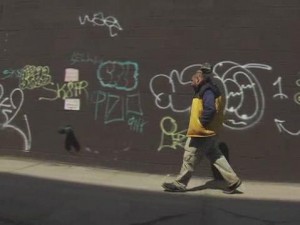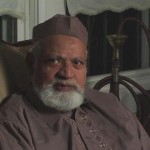 A Son's Sacrifice is a 30 minute documentary film that shows how the struggle to define one's identity spans religion and nationality. The innovative documentary unites the visions of two first generation American filmmakers from very different backgrounds. The film is co-produced by Yoni Brook, the son of a Jewish Israeli immigrant, and Musa Syeed, the son of Muslim Kashmiri immigrants.
A Son's Sacrifice is a 30 minute documentary film that shows how the struggle to define one's identity spans religion and nationality. The innovative documentary unites the visions of two first generation American filmmakers from very different backgrounds. The film is co-produced by Yoni Brook, the son of a Jewish Israeli immigrant, and Musa Syeed, the son of Muslim Kashmiri immigrants.
 The films's Executive Producer, Marco Williams, a professor at NYU Film School, is renowned for his groundbreaking film, Two Towns of Jasper, which explores a community racially divided over the brutal 1998 murder of an African-American boy in Jasper, Texas.
The films's Executive Producer, Marco Williams, a professor at NYU Film School, is renowned for his groundbreaking film, Two Towns of Jasper, which explores a community racially divided over the brutal 1998 murder of an African-American boy in Jasper, Texas.
UPF made a small completion grant to support this innovative documentary from Foment Films to air on public television stations nationwide in early 2007.
A Son's Sacrifice follows the journey of Imran Uddin, a young Muslim who confronts his roots at a halal slaughterhouse in New York City. Like many first generation children of immigrants, Imran was born to a hardworking father who hopes his son will surpass him to become a successful American. Caught between an innate desire to preserve his Bangladeshi heritage and the pressure to develop into the all-American man his father envisions, Imran decides to take over his father's business, an old-fashioned slaughterhouse that caters to the halal dietary needs of its Muslim clientele. The filmmakers document Imran's experience as he finds his identity during an annual ritual that forces him to define himself as a Muslim and a son.
During the holiday of Eid-al-Adha, when Muslims are commanded to slaughter an animal and distribute part of the meat to the poor, hundreds of Muslim families are drawn to the Uddin's slaughterhouse in Queens. The celebration holds symbolic meaning for the fathers who pass this tradition onto their sons, but it also requires grueling work from the men who run the slaughterhouse.
Within the Muslim and South Asian communities, there is a great diversity of cultures and beliefs. For the Muslim community, the film's main characters embody Islam's pluralistic values by practicing and interpreting Islam in different ways. For the South Asian community, the storefront slaughterhouse is a model of coexistence as it unites Hindu, Sikh, and Muslim customers in a common need.
The film draws parallels between contemporary Muslim rituals and the practices of fellow descendants of Abraham: Jews and Christians. The identities of Jews and Muslims are intertwined with their food. Kosher and halal practices present an opportunity to explore each other's community. The dietary laws unite the two religions in a need for food that strengthens their religion and identity.
A Son's Sacrifice takes into the inner life of Imran as he confronts his father, his faith, and his community, ultimately claiming his own unique place in multicultural America. In addition to UPF's small grant, the film received primary funding from The Harvard University Pluralism Project, The Independant Television Service (ITVS) and The Hartley Film Foundation.
The Team Behind A Son's Sacrifice
A talented team of individuals worked hard to create this documentary.
Musa Sayeed: Co-Producer
Syeed has written, produced, and directed several short films and plays about racial and religious experience in America. He has also worked in marketing and development at Miramax, as an editing assistant on feature length documentaries, and as a casting associate and consultant on feature films.
Syeed has been extensively involved in promoting interfaith relations at local Islamic centers and campuses, emphasizing Jewish-Muslim dialogue. He has worked as an educator in schools, community centers, and prisons.
An alumnus of New York University's Middle Eastern & Islamic Studies and Tisch School of the Art's Film & Television Departments, Syeed will be a 2006 Fulbright Fellow in Egypt specializing in experimental filmmaking.
Yoni Brook: Co-Producer
Brook has worked as a photojournalist for The New York Times, The Washington Post, The Seattle Times, and magazines including Fortune and Newsweek. He has directed and served as a cinematographer on numerous documentary and short films.
His work has received the highest honors from the Pictures of the Year International and the Best of Photojournalism competitions. He was named the College Photographer of the Year by the Missouri School of Journalism and of one of Photo District News' 30 Emerging Photographers. He is the recipient of the Marty Forscher Fellowship for Humanistic Photography from the Parson's School of Design.
Brook is an alumnus of New York University's Tisch School of the Art's Film & Television Department.
Marco Williams: Executive Producer
Williams is an award winning documentary and fiction film director. Over twenty-five years he has produced films confronting issues of race, ethnicity, and family relationships.
His directing credits include: I Sit Where I Want: The Legacy of Brown v. Board of Education (2004), MLK Boulevard: The Concrete Dream (2003), Two Towns of Jasper (2002), Making Peace; Rebuilding our Communities (1995), The Pursuit of Happiness: With Arianna Huffington (1994), Without A Pass (1992), In Search of Our Fathers (1991), From Harlem To Harvard (1982).
His film Two Towns of Jasper documented the trials of the three men charged with dragging James Byrd Jr. to his death. The film was a collaborative effort between black and white filmmakers, who used segregated crews to document the town of Jasper, Texas during the trial.
Two Towns of Jasper was broadcast on POV on PBS, the film and the directors were featured on the Oprah Winfrey Show, Nightline with Ted Koppel, and the film was the catalyst for a live town hall meeting - "America in Black and White", anchored by Ted Koppel.
Two Towns of Jasper was the winner of the 2002 Pan African Film Festival Outstanding Documentary Award, the Hot Docs Canadian International Film Festival Silver Award for Best International Documentary; the recipient of the 2002 DoubleTake/Full Frame grand prize: The Center For Documentary Studies Filmmaker Award, and the winner of the 2002 Independent Feature Project Third Annual Anthony Radziwill Documentary Achievement Award.






